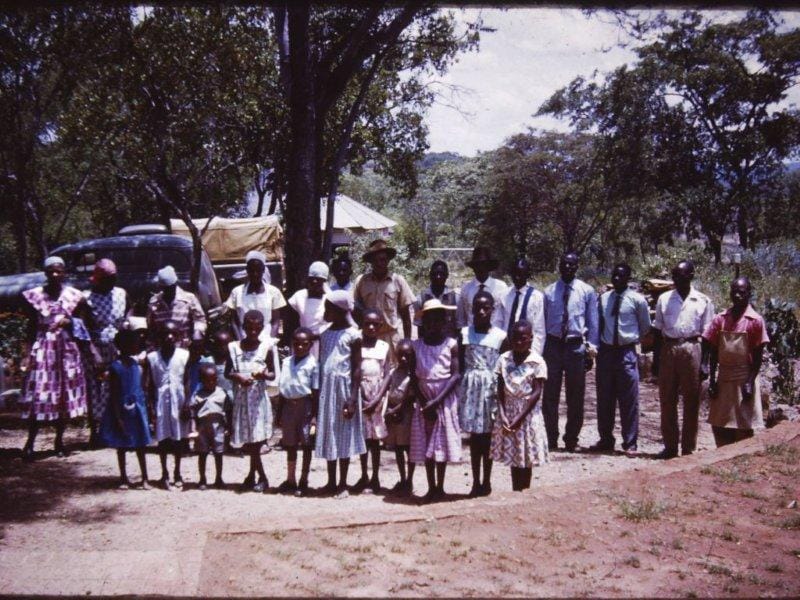A Christmas to Remember

1961, Happy Times. Gervas Hughes’ farm staff dressed in their Christmas bonsella clothes: new shorts and shirt for the men, a new dress for the women and sweets for the children.
A Christmas to Remember
Life was lonely on the farm and Joan was anxious for the children, Angela and Tim, to have a wonderful Christmas in Salisbury with their mother’s great friends Bishop Paget and his wife Rosemary.
Joan made them some new clothes to wear from anything she could find. They were all set to go the day before Christmas Eve. The children had packed and unpacked their bags a hundred times in readiness.
A Christmas to Remember
But Gervas came in and said regretfully, “I can’t possibly get away. The cows are sick. I’ve got all sorts of other pressing problems. I can’t let you take the only vehicle. I’m very sorry.”
Joan was so disappointed. What she could do to make it up to the children?
Stockings were a real problem. She sat up all night sewing, adding little oddments of cotton wool and ribbon for decoration. She stuffed a few toys in the stockings she had brought from home to give out on a rainy day.
She went off on the horse and visited various native huts.
“Sakubona! Kanjani wena Baba?” I see you! How are you old Father?
‘Sakubona Nkoskas! Mina muhle. Kanjani wena Nkoskas?” I see you Madam! I am well. How are you Madam?
“Mina muhle. Kanjani lo mfazi na lo zingane kawena Baba?” I am well. How is your wife and your children old Father?
“Zonkie yena muhle. Kanjani Matambega, lo Inkos?” They are all well. How is Boss Matambega (The One Who Can Be Trusted)?
“Yena muhle zonke na lo mtwana gayena. Kanjani lo umbila gawena?” Matambega is well along with his children. How are your mealies?
“Mvula yena aiziko. Umbila yena ifa skati lo mvula yena hayikona figa.” There is no rain. The maize will die if the rain doesn’t come.
“Mina funa tenga nkukhukazi. Mena funa puza yena skati ga lo Kisimus.” I want to buy a hen. I want to eat it at Christmas.
“Aiziko nkukhukazi lapa gamena, muhle Nkoskas yena buza lo mfazi lapa mfula.” I don’t have any hens, it is best if the Madam asks those women there by the river.
“Sala muhle Baba!” Stay well old Father!
“Hamba muhle Nkoskas!” Go well Madam!
Eventually Joan found a scrawny hen. It was definitely not a turkey, but it would have to do. Philip, the cook, dealt with killing and plucking the hen, and put the inside outside. Joan cooked it.
She invented a cold Christmas pudding with currants and raisins, lemon peel, cooking sherry… and gelatin! She put in a few silver trinkets she found in a drawer and found some tickey’s (thruppenny bits) which she boiled thoroughly, to add at the last.
She explained about Father Christmas. “You see he was expecting you to be in Salisbury, so I don’t think he had a lot left over when he heard you’d be here.”
They accepted this explanation happily. They had a lot of fun digging into their makeshift stockings at dawn.
The dinner too was a roaring success. They were thrilled to wear their new clothes and sit up late, eating grown up food. They were charmed with the treasures in the rapidly melting, slightly boozy pudding.
“When’s Easter?” asked Tim the next day.
Excerpt taken from Rain on the Roof, by Joan (nee Millard) Freyburg (1999) ISBN 0 646 38477 5 with family permission. Tim Hughes has electronic copies of this wonderful book that may be available on request via the comments section of this blog.
